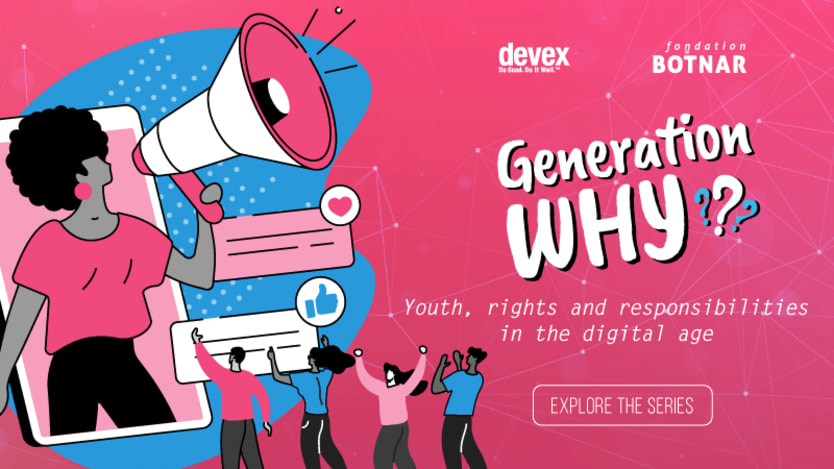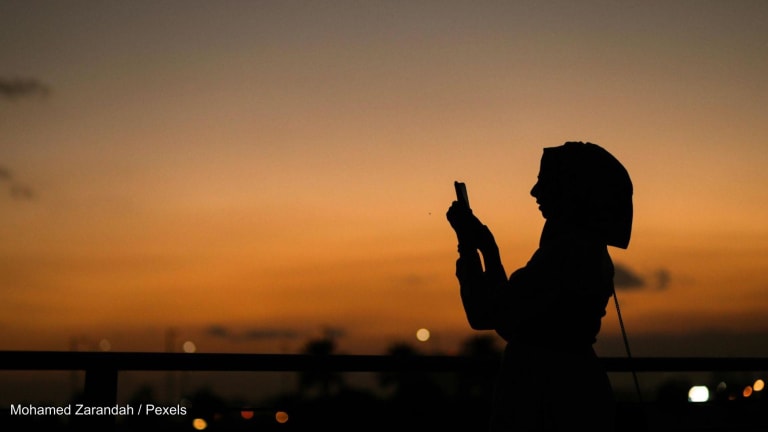
The internet and digital apps such as WhatsApp, Snapchat, Instagram, and Facebook are the main platforms my friends and I use to communicate, share our lives, and engage. On the one hand, these digital spaces allow us to freely express ourselves, connect with others around the globe, and more importantly, mobilize quickly for change. However, underneath the often heavily filtered, enhanced, and targeted lens of this digital world, is a place where children and young people like me are exposed to human rights violations on a daily basis.
Disinformation on social media platforms is having a direct impact on children and young people across the world. Whether through content that reinforces negative stereotypes or perpetuates discriminatory views. For example, many social media companies including Facebook, Twitter, and Instagram allowed their money-driven algorithms to spread harmful misinformation about the global pandemic, prioritizing the sensationalist and the discriminatory over the truth.
This had far-reaching consequences, including contributing to vaccine hesitancy, particularly among younger people. With more pandemics or global disasters set to hit in the future, have we left ourselves exposed, vulnerable to manipulation by states intent on spreading misinformation for political gain or corporations looking to profit from our data?
More often than not, digital misinformation demonizes the most vulnerable groups. And as people, we must all play our roles in preventing this. Amnesty International’s Secretary General, Agnès Callamard told me during an intergenerational dialogue in October: “The weaponization of technology and social media means that women, girls, and LGBTIQ people are particularly at risk of harassment and threat online.”
With content moderation still largely ineffective, there is a lot of latitude around what you can post online, which as we regularly read in the news, has a devastating impact offline, particularly for young people and children. With social media sites often creating fertile ground to stoke division and hatred, what does this mean for us going forward?
Agency and privacy are shrinking
The effects of the constant violation of privacy in online spaces will be felt in the future, specifically by people my age and younger. In the Philippines, where I’m from, the anti-terrorism law allows wiretapping by the government at any time. Unregulated collection and use of data, and our limited understanding of its use by public and private institutions, means that teens who share or search for information on sensitive subjects have no idea how that data may haunt them in 10, 15, or 20 years when they are applying for health care benefits, student loans, mortgage applications, and more.
The exponential growth of technology has concentrated vast power in the hands of a select and unaccountable few who have created an endless quest to drive profits through data capture. They are simply paying lip service to our human rights while cashing in on us. Our agency and privacy are shrinking. Technology should serve humanity, not the other way around.
My peers and I are to inherit the fallout of this technological revolution. So, I ask — what must happen to change this? In the first instance, as Amnesty International’s Callamard puts it, we must be “proactive.” I couldn't agree more — it is more important than ever that Big Tech companies are held accountable for respecting human rights.
Digital rights activists in Southeast Asia increasingly at risk
As authorities in the region clamp down on online activism through increased surveillance and the misuse of cybersecurity laws, the need to protect human rights defenders — both online and offline — grows.
In her own words: “Companies are violating the right to health of children, and by the time we have challenged them, the digital world will have already moved to a different space, so we also need to be really adaptive and future-minded.” It is difficult to imagine what a post-Twitter, post-Facebook, and post-TikTok digital world would look like. The only thing we can be certain of is that there will always remain actors who will violate human rights.
Being proactive, not reactive
But it’s also down to governments to play their part. As long as states fail to enforce digital regulation and data protection laws, these companies will never adopt rights-respecting business models on their own. Children and young people are fundamental to shaping our future digital world. Governments and tech companies must work hand-in-hand with us to pave that path forward. They must ask questions such as: What do we want from our digital spaces? How can we ensure young people are safe? What does accountability look like to young people? Only then can we ensure that even in the digital space, human rights remain protected and guaranteed for all of us.
During our conversation, Callamard proposed the following challenge, which I take very seriously: “We must all tackle the human rights issues of today, with an eye on the future, knowing we are accountable to the world of 2040, and to you and your peers. As adults, we must ask how our actions are impacting the children of tomorrow. But most crucially, we need to make sure that children too are setting the agenda for the years to come. My call to you is to prepare for the next generation of toxic actors. We need to be proactive instead of reactive and focus on imagining what the digital space is likely to be, what it should be, and prepare to fight back.” And as a young person, I realize that we are working for change for young people worldwide — and we must fight back for our future.
In Filipino culture, challenging the status quo and those who hold power tend to be frowned upon and adults often shout “bata ka lang” at us, which means “you're still a child.” In an adult-dominated world, it can feel very unsafe for human rights youth activists to stand up for their rights, but remember: your voice matters. After all, this is not just our future — but our fight for human rights today.
Visit the Generation Why series for more coverage on how we can ensure the digital space advances the rights of all young people and leaves no one behind. You can join the conversation using the hashtags #DevexSeries on #DigitalRights.









